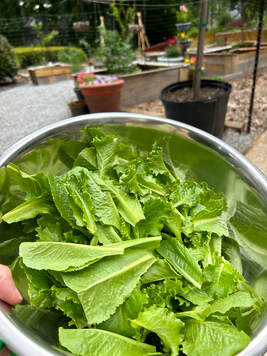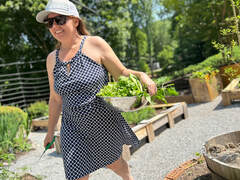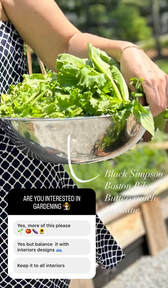 A kitchen garden is a wonderful addition to any home, providing fresh and flavorful herbs, veggies, and fruit just steps away. Here are a few tips to maximize the productivity of your kitchen garden! As gardeners we want to enjoy bountiful harvests throughout the year, and implementing intensive planting techniques, can help you achieve it. Intensive planting involves growing more plants in a smaller space, allowing you to make the most of your garden's potential. One of the key benefits of intensive planting is the ability to grow a wide variety of crops in a limited area.  When I first started in this method, I was shy about it, putting maybe 40 plants in a 4x4 bed. In reality to keep your soil moist and productive you want every inch of the garden bed blooming with no visible soil. So that really means closer to 200 plants in a 4x4 bed. Crazy right? But you can't argue with great harvest and mine tripled once I started using intensive planting. My peppers have onions, garlic, chives, and arugula growing all with in a one foot radius around the pepper plants base. The leaves of the pepper plant provide shade to the lettuces and the onions, garlic and chives not only provide excellent additions to my meals, but also protect the peppers from insects - with this organic method and regular tending I never have to use chemicals on my plants. I use trellises, arches, and hanging baskets, to grow vining plants like cucumbers, beans, and peas and tomatoes upwards, saving valuable ground space. Vertical gardening not only increases your yield but provides an eye catching look in your kitchen garden.  Efficient watering plays a big role in intensive planting. Use drip irrigation or soaker hoses to deliver water directly to the plant's roots, reducing water waste and weed growth. Many gardeners mulch with hay, but I like the compost method instead. I mulch only with mushroom compost every one to two weeks. Place gentle handfuls around each plants base without touching the leaf systems of the plant. At the same time I trim back any leaves that are lower to the ground or touch the dirt to prevent the spread of disease from the soil to the plant. Are you ready? Roll up your sleeves, get creative, and transform a portion of your yard into your own kitchen garden stocked with amazing harvests all year long!
|
Categories
All
AuthorRachel Aissen is an award-winning meteorologist, Archives
February 2024
Categories |

 RSS Feed
RSS Feed